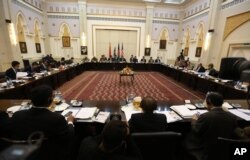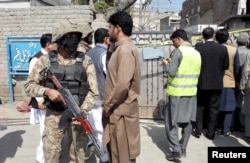Pakistan has urged Afghanistan’s Taliban not to require conditions for direct peace talks with the Afghan government.
“The basic message [to the Taliban] would be that many of the preconditions that they are putting forward can come as a result of the negotiation and not in advance, like prisoners exchange and freedom of movement [of Taliban leaders] et cetera,” said Sartaj Aziz, the Pakistani prime minister’s adviser on foreign affairs, at a news conference in Islamabad Tuesday.
The long-awaited internationally-backed Afghan reconciliation process was expected to start in Islamabad the first week of March, but, in a last-minute announcement Saturday, the Taliban refused to attend.
Taliban's refusal
The Taliban insisted that “such futile and misleading negotiations will not bear any results” until all foreign forces leave Afghanistan, “innocent prisoners” are freed and international travel restrictions on insurgent leaders are removed.
The announcement dealt a blow to efforts that Afghanistan, Pakistan, China and the United States have recently initiated as part of a four-way coordination group to arrange the talks.
Aziz said Islamabad, Beijing and Washington are acting as facilitators in the four-way process, and all three now have a shared responsibility to contact and persuade the Taliban to come to the negotiating table.
“The Afghan government has already repeated their invitation for them to come forward, so I hope in the coming days some process can start at some level in which case once it starts I am sure it will gather momentum,” Aziz said at the press conference, which visiting British Foreign Secretary Philip Hammond also attended.
The United States on Monday backed a call by Afghan President Ashraf Ghani for the Taliban to join peace talks with the Kabul government.
"They have a choice. Rather than continuing to fight their fellow Afghans and destabilizing their country, they should engage in a peace process and ultimately become a legitimate part of the political system of a sovereign united Afghanistan,” State Department spokesman John Kirby told a media briefing.
The delay in starting talks could intensify fighting later this year and there are fears the violence will further strain Afghanistan’s relations with Pakistan, where Taliban leaders are believed to have taken shelter.
Islamabad also alleges that fugitive Pakistani insurgents are using Afghan territory to plan terrorist attacks in Pakistan.
Need for further cooperation
Hammond Tuesday said years of “lack of trust” hamper bilateral cooperation, but he emphasized the need for Pakistan and Afghanistan to work together to root out cross-border terrorism.
“This is a mutual problem. There are people carrying out terrorist attacks in Pakistan who are fleeing into the relative safety of improperly governed areas of eastern Afghanistan. There are people carrying out attacks in Afghanistan who have been using ungoverned space in Pakistan as a haven. And what needs to happen is for both governments to work together to ensure that there is no space in their respective countries for people who are seeking to attack the other country.”






